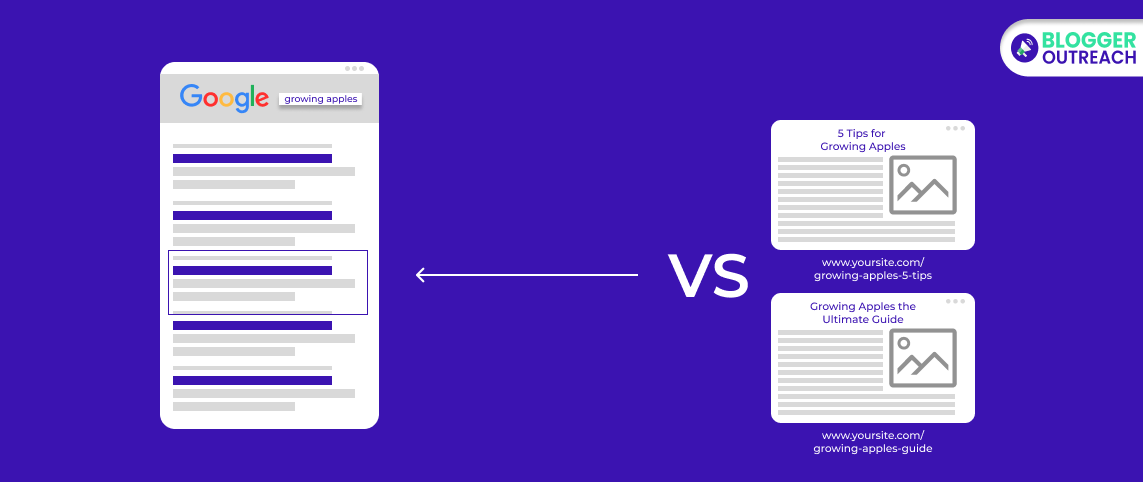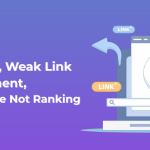Table Of Content
SEO is all about keywords, targeted keywords, optimizing keywords, and it goes on and on. Existing players in the SEO game know the importance of keywords to boost visibility and search rankings, however, overdoing anything is bad in the long run, especially in the competitive marketing landscape.
Hence, you must know how to become the keyword master and not fall into the hands of keyword cannibalization.
When optimizing your posts for similar keywords, your rankings are bound to fall from keyword cannibalization, where you will be devouring your chances at ranking high, especially when your site is growing. Targeting and optimizing a specific term can do more harm to your SEO.
In this blog post, we will take you through the journey of keyword cannibalization, explain how detrimental it can be to your SEO, and provide optimum solutions to protect you from the danger of cannibalization in SEO.
Table Of Contents
‣ What is Keyword Cannibalization?
‣ Why Keyword Cannibalization is Bad for Your SEO
‣ How To Find Cannibalization Mistakes in Your Page
‣ How to Fix Them?
‣ Final thoughts
What Is Keyword Cannibalization?

Keyword cannibalization is a grave SEO issue that arises when multiple website pages target similar or similar keywords. This leads to internal competition for search engine rankings between pages of the same website. Cannibalization in SEO can dilute your website’s ability to rank high for targeted keywords.
It is known as ‘cannibalization’ because you are sabotaging (rather feeding upon) your results by splitting links, content, and click-through rates (CTR) between two pages that should’ve been one single page.
For instance, to understand keyword cannibalization, let’s look at this example. Say your brand is known for selling shoes, and ‘shoes’ is the only targeted keyword used across your service/product pages. You are telling Google that every webpage is about shoes, regardless of their types, such as tennis shoes, hiking shoes, sneakers, etc.
Instead of capitalizing on long-tail keywords (phrases made with three words) such as women’s shoes, gym shoes, etc., you’re in direct competition with your web pages for that ‘one‘ keyword that may be too broad for its commercial intent.
Why Keyword Cannibalization Is Bad For Your SEO
In one phrase, keyword cannibalization is ‘bad’ for your business. However, most companies do not even know that they are in hot waters while being in hot waters! A similar situation arises in keyword cannibalization, where businesses suffering from the disastrous consequences of content cannibalization do not even realize it before it is too late.
For instance, if two of your pages are targeting the same keywords, one of them ranks high on the search engine results page (SERP) while the other (one you expected to rank higher) is nowhere to be seen.
One could clearly argue that this is a case of textbook keyword cannibalization where one page seemingly cannibalizes traffic of the other page; however, let’s break the myth and not scratch our heads as victims of keyword cannibalization.
That is NOT a case of keyword cannibalization. There is no need to worry about traffic based on just ‘one’ keyword. In this case, there is no issue because these pages are not likely to harm your website’s overall performance.
If we were to delete those keywords or the pages altogether, we might as well see a net drop in traffic due to losing other important keywords.
Now, let’s see when there is an issue with keyword cannibalization.
(i) Dwindling The Authority Of Your Webpage
Instead of focusing on one high-authority page, you make the biggest mistake of splitting your click-through rates among moderately-ranking pages. Essentially, you have turned your web pages against each other, and now they are fighting for SERP rankings.
(ii) Diluting Links And Anchor Text
Backlinks that could’ve been leveraged by one joint source of information are now being split into two. Brand reach efforts go to waste when consolidated sources of resources are split into two. Along the same lines, your internal links and anchor text lead visitors to multiple pages except one high-value authoritative page.
(iii) Devalued By Google
Keywords are the mirrors of the SEO world. They help Google understand what the pages reflect. If your keywords are the same, Google tries to analyze which page is the best, and if the content is too similar, Google might get confused and low-rank both pages, thereby missing out on high-value converting traffic.
(iv) Sign Or Poor Page Quality
Having multiple pages with the same targeted keywords creates a bad reputation for the business as it tells your users that your content is stretched thin, and you lack market expertise. It also tells Google that your content might not match the targeted keywords.
How To Find Cannibalization Mistakes In Your Page
You don’t have to scratch your head to find keywords that cannibalize your content. It’s quite simple!
Usually, a quick search along the lines of ‘Domain+ keywords” will provide you with all the information you need to spot your mistake.
For instance, if you are in the pet care business and have your website name, “PetsSafeWithUs.Com,” and you want to search for keyword cannibalization for a dog collar, you would search “PetsSafeWithUs.Com,” dog collar, and similar variations.
You will see a list of results, but do they resonate with you? Is the pet care blog you wrote a year back somehow ranking higher than your recent and more important ones? If this is the case, your page is a victim of keyword cannibalization.
Do not fret as there are multiple, easy ways you can put an end to the SEO horror show.
How To Fix Them?

Here are some points.
(i) Restructure Your Website
The easiest solution to your keyword cannibalization issue is to take your best and most authoritative page and turn it into a landing page that links all variations of a service/product back to the authoritative site.
Considering our previous ‘shoe’ example, it would be logical to make ‘shoes’ your canonical source page and link all the different variations back to it.
(ii) Delete Old Content
This is an extreme solution that can be used if all windows and doors are closed. You might want to consider the ‘deleting fix’ in cases where your old page content is not relevant anymore.
This is the best quick fix if your business has grown considerably and you notice one of your ‘not-so-good’ blogs suddenly starts ranking higher than your desired pages. The best thing to do in that situation is to opt to delete the pages using certain keywords.
(iii) Change The Game Of Your Internal Linking
If you have web page content that links to other pages on your site, then the links might need to be improved. Links establish importance for Google and other search engines, where including a link to another webpage’s content might rank the linked content higher.
Try changing or adding the internal linking of your page so that less important content links to the page you want to prioritize. By doing the same, you effectively send a signal to the SERP that the linked content needs to be prioritized.
(iv) Use 301 Redirects
Though this strategy is unpopular in the SEO game, using 301 redirects (a permanent redirect from one link to the other) might be necessary if you have multiple pages ranking for the same keywords. Using 301s can help you strategize your cannibalized content by linking the less relevant pages to a more authoritative one.
Remember that this strategy is only suitable for pages with similar content and those matching queries related to specific keywords.
Final Thoughts
Keyword Cannibalization is not as bad as it sounds- at least for businesses that have mastered SEO know-how. Myths surrounding SEO cannibalization have introduced this fear into agencies that strive to rank high.
Google does not simply get ‘confused’ by similar or the same keywords on multiple pages with identical content. It knows what those pages consist of and ranks them accordingly.
That does not mean Google will rank the page that you want. But that does not mean that it is ‘ranking the wrong page,’ and that does not indicate that there is a ‘grave danger’ as most agencies would like to project.
As a result, multiple agencies have jumped into the solutions and are taking drastic action to fix the problem. Most of the time, these ‘quick fixes’ do more harm than good.
Read Also:








